|

'The Aspen bleed'
1908
Theodor Kittelsen
1857 - 1914
_______________________
Linguistic Anxiety and the Deconstruction of the Self in the Realm of the Ridiculous
J.J Phillips
exquisite corpse
(....)
Even if I didn’t know how to spell or use the English word “laconic,” staging this elaborate fit of pique to ridicule me in this manner, and within earshot of his staff, wasn’t ‘just’ a gratuitously cruel and outrageous way to treat anyone, especially someone in a vulnerable psychological state, who’d come to him seeking help. His petulant refusal even to attempt to understand what I was getting at (not to mention refusing to understand me when I was making sense) and casually degrading me as he did, was completely discombobulating and deeply destructive psychologically and neurobiologically. And he got off on it. I wasn’t in training to be an analyst – where I get the impression that such practices are frequently de rigueur, part of the rites of passage; though I also learn that for some, sadistic degradation and mind-fucking patients is a clinical style, which could perhaps be termed Zilboorgian, after Gregory Zilboorg, George Gershwin’s analyst.
The lodestone of my internal compass instantaneously demagnetized. The fear that I might not be making sense, and that even if I was, my words could summarily be declared gibberish at any time without examination, at the whim of any jerk with an engorged but brittle ego and a sadistic streak, stoked my already considerable anxiety regarding my basic linguistic and cognitive competency, and profoundly destabilized my sense of self to the degree that I was stupefied. When I left his office, I hardly knew which direction to take and my otoliths were so rattled that I couldn’t make my way down the street in a straight line or walk without stumbling. It’s a wonder I found my way home without being hit by a car. This was much more than an attack on my psyche and a semi-public humiliation: he was fucking with some critical areas of my brain, and it was a calculated attack. I couldn’t have been made to feel more stupid and worthless, and he knew it. He set me up and sucker-punched me, and I walked out of his office disoriented and reeling just as sure as if he’d actually slammed me in the solar plexus with his fist.
The fact is that I sometimes have experienced what to me are alarming cognitive and linguistic fluctuations, even disintegration and destruction, to a greater or lesser degree, with consequent destabilization and destruction of my identity; most frequently triggered or exacerbated by external factors on the order of what I describe here. Though my powers of thought and expression are always in need of correction, development and strengthening, and circumscribed by my inherent cognitive and linguistic deficits – if I actually don’t make sense, that’s one thing; but whether by force or by subtler forms of coercion, it’s quite another for someone in the throes of his or her own cognitive-linguistic anxiety and lust to dominate, to act as high priest or priestess of a jealous language g-d of the gap and turn me into my own g*d ambulatory Tower of Babel,4 or strike me mute.
...(more)
_______________________

Shiko Munakata
_______________________
Distant ruins
Paul Gilster
aeon
‘Look on my works, ye Mighty, and despair!’ says Ozymandias’s ruined statue in the desert of Shelley’s imagination. Shelley’s sonnet is often interpreted as a sober warning that human works are fleeting, but when I read it as a young boy it kindled a sense of adventure; it suggested a wonderfully mysterious past beneath my familiar suburban surroundings. As a child, I was obsessed with archaeology, the attempt to understand the past through enigmatic remains. I spent many afternoons digging up dark patches of Midwestern soil, as I searched the region’s dense forests for artefacts of the Mississippian Indian cultures. I never found a lost city, but I occasionally turned up an arrowhead that would set me speculating about its owner and how it was lost. Through archaeology, I came to see landscapes as temporary surfaces that concealed a deep history. The world became rich with hidden texts.
Boyhood obsessions often linger into adulthood, even if they aren’t immediately recognisable. These days I find myself looking up into the Milky Way’s majestic thread, wondering if its stars play host to monuments as haunting as those found in Egypt’s Valley of the Kings. The natural sciences tell us that time is deep, and that civilisations could have arisen well before the Earth formed. Today, a small group of interstellar archaeologists is looking for evidence of those civilisations. They are tantalised by the possibility that the universe is not just a birthplace of alien cultures but also their necropolis.
...(more)
_______________________

Birthplace of Walt Whitman
Woodcut, circa 1960
Shiko Munakata
d. September 13, 1975
_______________________
Akim, Zappy and the Green Eye
Pierre Joris
exquisite corpse
from Pierre's ongoing memoir
Is there life before reading? I am not certain — & grow less certain as time passes, as I grow old & memory, like nostalgia, isn’t what it used to be. So if you ask me what it was like to be a child, I will have a hard time answering — and not just because I do not remember it as being the best time of my life. Not that I wouldn’t be interested in finding out for myself. But how to be a historian of one’s own past, if istorin — the Greek word for history — means for the one historian I trust (because I love to read him) to find out for oneself. How can I go there from now? Maybe I can write myself there, i.e. activate dreaming and reading and come back forward.
And thus the earliest — supposedly paradisiacal, even if or maybe exactly because, forgotten — state of childhood I cannot help but associate with non-reading, so that “prelapsarian” always rhymes with preliterate in my mind. Where was I? Rue Glesener, in the southern quartier de la gare of Luxembourg. When was I? Not yet, not yet. I lack photos of that time, cannot see myself, and the google map doesn’t get me closer than 200 meters for an inch.
...(more)
_______________________

Shiko Munakata
_______________________
Post-Work: Zombie Social Democracy with a Human Face?
Andrew Kliman
(....)
The basic flaw in the thinking of Kalecki, Graeber, and the zombie social democrats now, and of the Mitterrand government three decades ago, is political determinism. They think that the capitalists control capitalism––not the other way around––so that the system can become something it’s not once different people with different priorities assume control of it.
I on the other hand think that historical experience and a bit of reflection show that the system has a “logic” of its own, so that what must be replaced is the system itself, not just the current personifications of it. Technological possibilities notwithstanding, there isn’t going to be much progress toward a post-work society, or indeed a lot of other good stuff, until we grapple seriously with the fact that capitalism operates as it does because of its autonomous logic, not because of the specific priorities of those who happen to be running the system at any particular moment. If we don’t deal with this problem head-on, the inspiring post-work vision will simply degenerate into a slogan used by wannabe personifications of capitalism to win support for their efforts to replace the current personifications.
...(more)
_______________________

Moonlit Coast
Frederick Judd Waugh
b. September 13, 1861
_______________________
The Ancient Roots Of Punctuation
Keith Houston

History
a play of Witold Gombrowicz
theater poster
designer: Henryk Tomaszewski
1983
Henryk Tomaszewski
2005
1 2
_______________________
BOMB 125 / Fall Issue
Bolaño wrote that Rey Rosa “is the most rigorous writer of my generation, the most transparent, the one who knows best how to weave his stories, and the most luminous of all.” Rigorous and luminous, spare and sensual, terse and hilarious, horrifying yet with a poetic, supernatural and metaphysical imagination, his writing—like that found in the novella The African Shore, just out from Yale University Press in Jeffrey Gray’s translation—throws open windows in your mind as you read. In one of those disconcerting coincidences that Rodrigo is famous for, it turns out that he is a close friend of my New York therapist’s. She sometimes asks me if that bothers me. It doesn’t, as long as he doesn’t put her into one of his novels, where undoubtedly she would reveal mortifying dreams that I wouldn’t even remember that I’d had. We conducted this conversation over terrible phone connections from Mexico City and Guatemala, patched through New York. Imagine us shouting like two nearly deaf old men in a noisy cantina.
- Francisco Goldman
Rodrigo Rey Rosa
by Francisco Goldman Translated from the Spanish by Ellie Robins
(....)
RRR ... In Mexico I decided I would never talk about violence again. It’s unpleasant to become associated with a topic. Also, violence can overwhelm you. You don’t choose it as your specialty; it’s a daily occurrence here in Guatemala and you just have to work with it.
(....)
FG In El material humano you basically explore the dilemma that everyone who writes and who has spent time in Guatemala faces. You let the reader see how it is to live in this atmosphere, so full of violence, death, and paranoia. You openly show a very ambivalent relationship to the country; you write constantly about the desire to escape. And you almost define the problem of being a writer in a situation like the one in Guatemala. You feel, first of all, that it’s a radical experience that changes you; you’re drowning in, and are being shaken by an incredible darkness. And you ask yourself: Why do I have to deal with this? What I’m seeing, is there anything universal about it? Do I have a duty to tell this story, should I leave, or do something else? So what was it like to return to Guatemala after so many years living abroad, in Morocco, New York, and Paris too, right? How did your writing change upon your return?
RRR As a writer, you can see being in this environment as a curse or a gift. It’s your destiny, your lot, to be from there, so what do you do with that? There are contradictory impulses. One day you say, “Well, it’s very good that I’m here,” since you have the opportunity to witness something so radical. But it’s also a misfortune, because this subject can absorb you, to the point of—
FG —damage.
RRR Yes, it can swallow you up. It hurts you. You don’t feel the same about it every day. It’s a question I’ve been asking myself for a long time, since I came back here almost 15 years ago: When do I leave for good, until what point is it wise to put myself at risk? Writers are personas non grata here, or nearly. For someone who wants to make a living as a writer, Guatemala is a good place, because it’s cheap. With the little money that I make from my books, I can live well here, and I don’t have to do other jobs, which wouldn’t be the case if I decided to live in Europe or even Mexico. Here I have family ties, a daughter. But I’m always fantasizing about leaving, even about where I’d go in a hurry, if I felt threatened. I have imaginary escape routes....(more)
_______________________
The Tech Intellectuals [pdf]
The good, bad, and ugly among our new breed of cyber-critics, and the
economic imperatives that drive them.
Henry Farrell
Democracy
(....)
These debates have created opportunities for an emergent breed of profes- sional argument-crafters: technology intellectuals. Like their predecessors of the 1950s and ’60s, they often make a living without having to work for a university. Indeed, the professoriate is being left behind. Traditional academic disciplines (except for law, which has a magpie-like fascination with new and shiny things) have had a hard time keeping up. New technologies, to traditionalists, are sus- pect: They are difficult to pin down within traditional academic boundaries, and they look a little too fashionable to senior academics, who are often nervous that their fields might somehow become publicly relevant.
Many of these new public intellectuals are more or less self-made. Others are scholars (often with uncomfortable relationships with the academy, such as Clay Shirky, an unorthodox professor who is skeptical that the traditional university model can survive). Others still are entrepreneurs, like technology and media writer and podcaster Jeff Jarvis, working the angles between public argument and emerging business models.
These various new-model public intellectuals jostle together in a very dif- ferent world from the old. They aren’t trying to get review-essays published in Dissent or Commentary. Instead, they want to give TED talks that go viral. They argue with one another on a circuit of business conferences, academic meetings, ideas festivals, and public entertainment. They write books, some excellent, others incoherent.
In some ways, the technology intellectuals are more genuinely public than their predecessors. The little magazines were just that, little. They were writ- ten for an elite and well-educated readership that could be measured in the tens of thousands. By contrast, TED talks are viewed 7.5 million times every month by a global audience of people who are mostly well-educated but are not self-conscious members of a cultural elite in the way that the modal reader of Partisan Review might have been.
In other ways, they are less public. They are more ideologically constrained than either their predecessors or the general population.
(....)
_______________________
Three
by Thomas Devaney
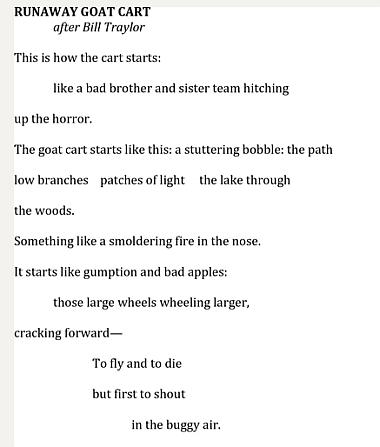
...(more)
Thomas Devaney at PennSound
_______________________
Contemporary Culture : New Directions in Arts and Humanities Research
Zijlmans ,Kitty --- Zwijnenberg ,Robert --- Thissen ,Judith
2913
from the introduction
The essays in this volume come out of a large-scale research program that was initiated in 2002 by the Netherlands Organisation for Scientific Research (NWO). The Transformations in Art and Culture programme was launched with two aims. It challenged scholars to think how the humanities could contribute to a better understanding of present-day processes of cultural and social change. The programme also aimed at reinvigorating the theoretical foundations and conceptual frameworks of humanities research and at building bridges with other fields of inquiry, notably the social sciences and the arts. By doing so, NWO sought to enrich the scholarly debates about the nature and future of the humanities and thus set the agenda for the years to come, well beyond the scope of the program itself.
This volume investigates how the interlocked processes of mediatization, globalization and commercialization have shaped cultural practices, social behaviour and feelings of belonging since the 1990s. While it is not a book about new media per se, most essays directly or indirectly address the profound impact of new information and communication technologies on everyday life. free download at The Directory of Open Access Books_______________________
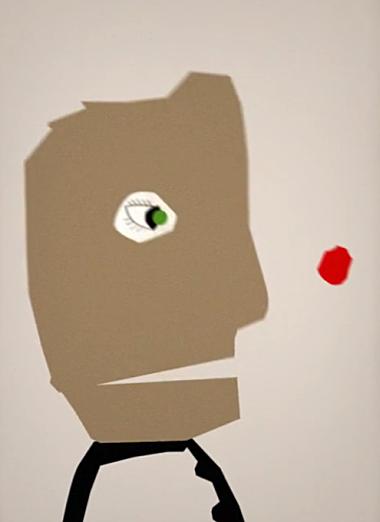
Henryk Tomaszewski
vimeo
_______________________
There is No ‘One True Take’: Our Thinkpiece Problem
Navneet Alang
hazlitt
I’m pretty sure it’s all Plato’s fault. It is perhaps he, more than any other thinker, who is responsible for that singular, defining element of Western thought: That a statement stands as truth when it resists all contradiction. Through the snaking dialectics of his Socratic dialogues, we learned that the ideal of truth was to use logical sequence to arrive at impossible-to-oppose assertions.
It has proven a resilient idea, and why shouldn’t it? If a wall gives off a certain wavelength of light that we call “red,” it cannot be true that it is green. If all the evidence we have suggests smoking causes cancer, it is false to say it does not. This is, according to some anyway, the core of traditional Judeo-Christian thinking: One notion, one truth.
(....)
It’s the predominance of the thinkpiece—and its cousins the op-ed, the strident link-bait post and the rant, and the swirl of cultural discourse they collectively form—that has me thinking about this. It’s a phenomenon that exists regardless of medium, but is often sped-up and concentrated online, turning said discourse into a seething matrix of opinion, crisscrossed with contradiction and anger.
...(more)
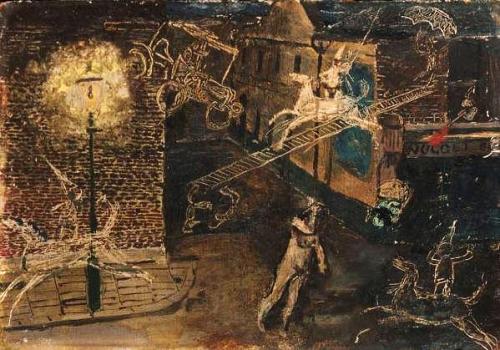
Hammersmith Nights
c. 1942
Carel Weight
b. Sept. 10, 1909
_______________________
Nocturnal Experiments
Flann O'Brien
Chapter VIII, Footnote 1, from The Third Policeman
presented by Tom Clark
Not excepting even the credulous Kraus (see his De Selby's Leben), all the commentators have treated de Selby's disquisitions on night and sleep with considerable reserve. This is hardly to be wondered at since he held (a) that darkness was simply an accretion of 'black air', i.e., a staining of the atmosphere due to volcanic eruptions too fine to be seen with the naked eye and also to certain 'regrettable' industrial activities involving coal-tar by-products and vegetable dyes; and (b) that sleep was simply a succession of fainting-fits brought on by semi-asphyxiation due to (a). Hatchjaw brings forward his rather facile and ever-ready theory of forgery, pointing to certain unfamiliar syntactical constructions in the first part of the third so called 'prosecanto' in Golden Hours. He does not, however, suggest that there is anything spurious in de Selby's equally damaging rhodomontade in the Layman's Atlas where he inveighs savagely against 'the insanitary conditions prevailing everywhere after six o'clock' and makes the famous gaffe that death is merely 'the collapse of the heart from the strain of a lifetime of fits and fainting'....(more)
_______________________

Nico Vassilakis
Staring Poetics
Two different eyes colliding:
Nico Vassilakis on the poetics of looking
jacket2
(....)
If words convey the image of a thought and letters are part of words, then parts of letters are...what's the most suitable response here?
In the past forty years, we have gone further into the neutron discovering more and more material. That final unit of information is what we seek in order to associate it to all other living material. Without the tiniest bit of the letter how can we have the word. A molecule is not possible without a sequence of atoms. The blind vispoets move about in the dark of their homes making and breaking code according to instinct. Science is the perfect unresolved pest.
...(more)
Nico Vassilakis at Elective Affinities
The Last Vispo Anthology: Visual Poetry 1998-2008 Crag Hill (Editor), Nico Vassilakis (Editor)
Language Is Hell
Nico Vassilakis and Quimby Melton _______________________
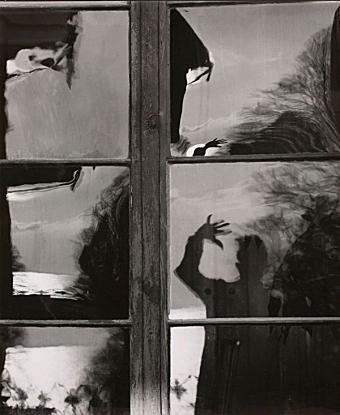
Self Portrait
1952
Toni Schneiders
(1920 - 2006)
1 2 3
_______________________
Photography and the Unconscious
The Construction of Pathology at the Fin de siccle
Temenuga Trifonova
ctheory
(....)
Earlier I suggested that the introduction of an 'external' mirror (the camera) had the effect of undermining the belief in an 'internal' mirror (the body as an image of the mind). I have to slightly modify my claim. By arresting movement, instantaneous photography revealed something dead, mechanical, automatic or unconscious at the very core of life (life=movement) thereby undermining the notion of a singular, absolutely self-present self that expresses or manifests itself fully and purposefully through its movements. Paradoxically, the discovery that the mind and the body are not absolutely co-expressible depended on reaffirming exactly the assumption that was being challenged in the first place: it was precisely because on some level the body continued to be thought of as an 'image' (or mirror) of the mind that it was now possible to conclude -- based on the photographic evidence of the body's automatism (the mechanical, the dead, or the automatic exposed through the arresting of supposedly purposeful, fully conscious movements) -- that the mind is not absolutely self-present either but rather inherently dual or even multiple. On the other hand, instantaneous photography's ability to arrest movement further undermined the previously assumed mirror relationship between mind and body: by arresting movement, instantaneous photography exposed every movement as made up of multiple meaningless, random, empty moments devoid of any significance outside of a sequence of uninterrupted movement. These autonomous instants failed to signify and were sometimes even 'guilty' of mis-signification. Whereas an uninterrupted movement could convey a body's exhaustion, for instance, the arresting of the body's uninterrupted movement produced a series of de-contextualized instants whose 'meaning' (the state of exhaustion they were supposed to express) could be easily misread as conveying, in fact, the opposite impression of energy: an individual instant could create the impression of an energetic body whose exhaustion became evident only when the whole movement unfolded uninterrupted. ......(more)
_______________________

The Silence
Carel Weight
1965
_______________________
Cruel Theory / Sublime Practice
Toward a Revaluation of Buddhism
Introduction
Glenn Wallis and Tom Pepper
(....)
Many questions present themselves. Does Buddhism even yield useful knowledge anymore? Doesn’t science provide more satisfying models of, for instance, perception and cognition, than does Buddhism? Doesn’t philosophy better articulate the questions that seem to animate Buddhist discourse on meaning, language, and being? Doesn’t psychology offer more effective forms and models of mental health? In short, are Buddhism’s institutions and beliefs too cumbersome and unsophisticated to satisfy any but the most willing to believe?
The single most important question for us is: Is Buddhism fit for modern life?
The answer to that question is far from clear. Indeed, there is little evidence that it has yet to be addressed at all, and certainly not in any sustained manner. Neither those who embrace Buddhist teachings nor those who reject them are inclined toward such questioning. To the former, querying is threatening. It begets the possibility of unforeseen and undesirable transmutation, even destruction. To the latter, such questioning is irrelevant; for they have already foreclosed on Buddhism’s viability. So, who does that leave? Who will ask the question?
The purpose of this book is to engage in a creative critique of Buddhism. In doing so, we neither take for granted the salubrity of Buddhist teachings for the contemporary western world nor bar the possibility of renovation and application. We see, rather, in the very process of critique an opening. In order to exploit this opening, however, we find it necessary to create drastically new, and buddhistically indefensible, theorems.
This book is a radical laying bare of the brutal refusal of x-buddhism to honor its most basic pledge: abetment of liberation.
This is a book of heresy.
...(more)
_______________________

(Woman Waiting)
Toni Schneiders
1951

photo - mw
_______________________
from David Markson, Vanishing Point
Spurious
I can't listen to music too often. It makes you want to say stupid, nice things. Said Lenin.
I like a view but I like to sit with my back to it. Said Gertrude Stein.
My memory and intellect have gone to wait for me elsewhere. Wrote Michaelangelo to Vasari at eighty-three.
...(more)
_______________________
Have our imaginations become so poor that we cannot think society without these two incredibly boring matrices, state and capital? It would be pathetic if we couldn’t come up with something better.
The Society Without Qualities
Lars Bang Larsen
The idea of a society without qualities is an indictment of a state that fails to provide a life of quality for its citizens. The society without qualities is one in which a systemic pressure on cultural and democratic institutions results in a whittling down of civil liberties. Where post-fascism is on the rise and where those who revolt are regarded by the elite as expendable. Where human relations are corroded in profitable ways and the future of the youth is mortgaged. And so you are turned into your own limit: you are your own weakest link because it is up to you to hold things together. It is a society without the historical teleology that the twentieth century had as an “American century.”
Of course, the society without qualities is a consequence of the evacuation that has taken place. Having realized itself to the extent that it has shed its historical constraints, capitalism is now free—victorious when identified with the state, when it is the state (Fernand Braudel). And so the idea of the state as a caretaker and an educator, an alleviator of pain, is no longer believable. The state has been presented with a new role, which it has accepted. Capitalism’s convergence with the state dissolves society—this was what Margaret Thatcher spoke of with the honesty of an executioner.
...(more) _______________________
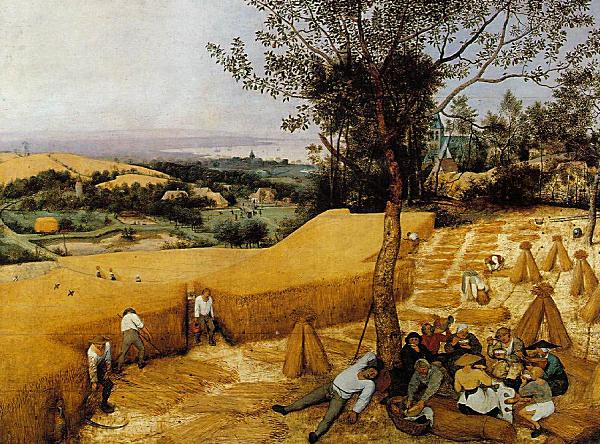
The Harvesters
1565
Pieter Bruegel the Elder
d. September 9, 1569
_______________________
Wittgenstein Jr.
In the shadowless summer, we will live in innocence, he says. In lightness. In grace.
And our souls will be transparent like the wings of summer insects.
And we will think as birds flit from branch to branch. We will think together like fish in shoals, nuzzling the surface. We will share a thought of life that is indistinguishable from life. We will share a thought that lives, a life that thinks ...
And the Logik will live, he says. The Logik will be alive at last, in the never-ending summer.
_______________________
Bud dha, Bud dha, ra ra ra!
Glenn Wallis
Speculative Non-Buddhism
(....)
Perusing the bodhiblogosphere, I can’t help but wonder whether this identification is intentional. The corporate world, after all, presents sterling examples of sprawling social influence and huge profit margins. So, why not mimic it? Is that the case here? Are our x-buddhist entrepreneurs consciously imitating their American capitalist masters for the obvious reasons?
Or is it a case of unconscious identification? A major activity of all varieties of American x-buddhism is to bemoan the debilitating stress caused in no small part by the role played by Corporate America in our society. How curious, then, to observe x-buddhism mimicking the corporate daddy. Or is this to be expected? Freud observed a tendency in his patients to punish themselves “in a hysterical fashion” after the death of a parent, and to do so, crucially, “with the same state [of sickness]” suffered by the parent.
Come to think of it, another way of viewing the x-buddhist tendency toward the censorship and intolerance—known in x-buddhist circles as “right speech”—is in light of this movement toward corporate clubbiness. Try an experiment. I suppose you’ve had to deal directly with organizations like Verizon or Facebook concerning some grievance. Do the same with some x-buddhist online teacher or organization. I predict that everything will be nice and chummy for a while—until the critical nature of your interaction sinks in. Then you will meet the cold, distant, and controlling core that lies beneath the compassionate façade of these x-buddhist hucksters.
...(more)
_______________________
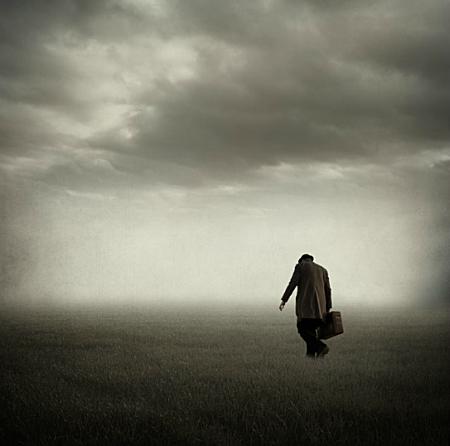
i need time
Philip McKay
via (OvO)
_______________________
Academy Fight Song
Thomas Frank
The Baffler
(....)
We don’t pause to consider that maybe we’ve got the whole thing backwards—that the big universities expanded in their heyday to keep up with industry demand, not to build the middle class. Instead, what everyone agrees on is this: higher education is the industry that sells tickets to the affluent life. In fact, they are the only ones licensed to do this. Yes, there are many colleges one can choose from—public, private, and for-profit—but collectively they control the one credential that we believe to be of value. Everything about them advertises it. The armorial logos, the Gothic towers, even the names of the great colleges, so redolent of money and privilege and aristocracy: Duke and Princeton and Vanderbilt. If you want to succeed, you must go to them; they are the ones controlling the gate.
What they sell, in other words, is something we believe to be so valuable it is almost impossible to measure. Anyone in her right mind would pay an enormous price for it.
Another fact: This same industry, despite its legal status as a public charity, is today driven by motives indistinguishable from the profit-maximizing entities traded on the New York Stock Exchange.
(....)
But by and large, once all the factors I have described were in place, it was a matter of simple math. Grant to an industry control over access to the good things in life; insist that it transform itself into a throat-cutting, market-minded mercenary; get thought leaders to declare it to be the answer to every problem; mute any reservations the nation might have about it—and, lastly, send it your unsuspecting kids, armed with a blank check drawn on their own futures.
Was it not inevitable? Put these four pieces together, and of course attendance costs will ascend at a head-swimming clip, reaching $60,000 a year now at some private schools. Of course young people will be saddled with life-crushing amounts of debt; of course the university will use its knowledge of them—their list of college choices, their campus visits, their hopes for the future—to extract every last possible dollar from the teenage mark and her family. It is lambs trotting blithely to the slaughter. It is the utterly predictable fruits of our simultaneous love affairs with College and the Market. It is the same lesson taught us by so many other disastrous privatizations: in our passion for entrepreneurship and meritocracy, we forgot that maybe the market wasn’t the solution to all things.
...(more)
_______________________

photo - mw
_______________________
Thoughts From the Bell Jar
larvalsubjects
... Doesn’t Deleuze somewhere say that “there’s nothing more distressing than ideas that slip away half-formed and unarticulated”? That’s how I remember the quote; and the way we remember things is often what’s most important… Not representation, but the life of an affective response that maybe, if you’re lucky, becomes something else. Ecclesiastes, one of my most important books– alongside Job –said “nothing new under the sun”. True. I soldier on with the belief that everything is worth repeating because not everyone has heard it (the materiality of the signifier, it must travel), and that there is no such thing as a faithful copy.
...(more)

photo - mw
_______________________
Interval
Karla Kelse
conjunctions
And so found myself to be the not-iris planted in the Mary Garden as in picture her eyes (forget-me-nots) her hair (maidenhair fern) her fingers fluttering as she speaks with her hands (potentilla). Called away from conversation exhausted and oriented towards contemplation of the marine, of polar properties causing dissolve, causing at the same time such tensility of surface so as to support the lightest plying across. So moved as water strider, gerridae, Jesus bug. Then plunged myself as a procession of salts from river to ocean to air to ridges of minerals thickening.
This way, as plot, I sat under his florals in my strapless and petticoat calling ark to the darkest center. Ark and then ark again to the in-between to what starts over as one who was charged with carrying the text, doves at the corners of my eyes. As one who, nevertheless, abandons her favorite cat to an empty field.
...(more)
_______________________
Hymn To Zeus
Robert Kelly
(....)
V.
Me, I look out the window
I see the air.
What can be wrong with me
that I can see the air?
The outside calls
to the inside,
air inside me too
solemn as Tennyson
blood-journeying oxygen,
caravaning its way through the frail brain.
My hungry eyes, my hungry eyes.
...(more)
_______________________

other small worlds
Michael Jackson
Recording a single beach, Poppit Sands,
for over 5 years now, Mikes work aims to show what is there when you spend years looking.
via junk for code
_______________________
How does writing fulfil itself?
Stephen Mitchelmore
(....)
In the gloom and tension of the situation, I opened Across (Peter Handke) and read the first lines:
I shut my eyes and out of the black letters the city lights took shape. Not the lights of the Old City, but the streetlamps that had just gone on in one of the many housing developments on the southern periphery. The development, consisting of two-storey single-family houses, is situated on the big plain at the foot of the Untersberg.
(Translated by Ralph Manheim)
And, as I did so, the gloom lifted and the tension disappeared, replaced by calm and relaxed concentration. At least, that's the story. At the time, a miraculous one. So why did this passage have this effect? The three sentences are straightforward and do not state anything profoundly meaningful about life. Not even close. Apart from the opening sentence, they could be from a local council planning document. Of course, it is the first sentence that makes it fiction: that odd, contradictory movement of eyes shutting to blackness and light taking shape as a result (there it is again, light), which might explain the transformation of my state into a story: the sense that narrative is parallel rather than subordinate to the conditions of life and one can easily step aside without abandoning one or the other. Among other things. This is how a modern novel might fulfil itself, by creating a clearing for this to be absorbed by the reader.
...(more)
_______________________
Minstrel Passage
Robert Antoni
” an excerpt from Robert Antoni's novel As Flies to Whatless Boys (Akashic, September 2013).
conjunctions
(....)
Yet it wasn’t the sprained ankle, nor his general condition of dehydration, that worried Dr. Worthington. It was Mr. Etzler’s mental state. The inventor now imagined heself pursued by unseen assailants, day and night, demons who didn’t allow him no kinda rest. Mr. Etzler barking at he invisible attackers in a language that neither Dr. Worthington, nor nobody else, could identify with any certainty. But which Mr. Stollmeyer decided was a lost Hebrew dialect spoken by the Pharisees. On those occasions when Mr. Etzler did return to standard English, or he native German, he fell into the confusing and exasperating habit of referring to heself in the 3rd person. So now you never knew if he was describing one of he demon attackers, or discussing he own ailments. When Mr. Etzler didn’t speak in 3rd person, he utilized the royal we.
...(more)
_______________________
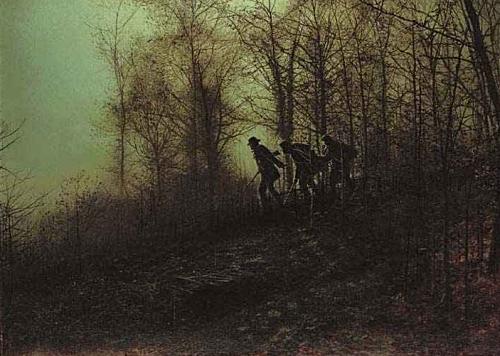
Poachers
1871
John Atkinson Grimshaw
b. Sept. 6, 1836
_______________________
Eradicated Alphabets and Radical Algorithms
Script Reform, Secularism, and Algorithmic Revolution
Ruth Miller
ctheory
(....)
But what might it mean to reintroduce these nonhuman elements back into the story of script and religious space? What might it mean to take the Alphabet Revolution seriously as a revolution of letters or symbols? First, it would mean recognizing that alphabetic characters continue to exist even when they are not being read -- that strings of letters or symbols can be as much operational or technical as expressive or representational. Second, it would mean re-thinking the character of Turkish secularism. If Turkish secularism can be produced so easily via the shifting and replacement of alphabetic symbols, then it too seems to possess algorithmic qualities.
This essay is therefore part of an effort to make the alphabet a more central figure in Turkey's story of script reform. It is an attempt to position Turkey's Alphabet Revolution as one example among many of a nonhuman, algorithmic politics at work in the world. Indeed, a case might be made that linking a shift in alphabetic characters to something called secularism makes sense only if we recognize the simultaneously political and computational qualities of these characters. Turkey's Alphabet Revolution works as a secular revolution, in other words, only if it also works as a function. God will thus make a reappearance at the end of the essay -- alongside an invitation to consider the potential of an algorithmic, rather than subjective, theory of secularism.
...(more)
_______________________

photo - mw
_______________________
Nick Piombino interview
re: being a psychoanalyst and a poet
The Conversant
(....)
Perhaps Lacan was right about putting a great deal of emphasis on words in his theory, but I don’t think this is as efficacious as he thinks. I believe the main thing is to become excited about and thoroughly immersed in the process of getting to know and trying to help other people to understand themselves and their lives, within the appropriate boundaries of a professional relationship. Of course I use dream analysis and free association and all the rest. But the concept of “interpretations” has little to do with the way I work. In my view, the patient’s insights begin to arrive when they catch on to the excitement of understanding themselves and their relationships more objectively.
To me, writers generally exaggerate the importance of words in their work, and perhaps psychoanalysts do the same. I realize this contradicts some of the things I wrote about when I was younger, but this is what I have come to realize after a lifetime of thinking about these things....(more)
_______________________

Michael Jackson
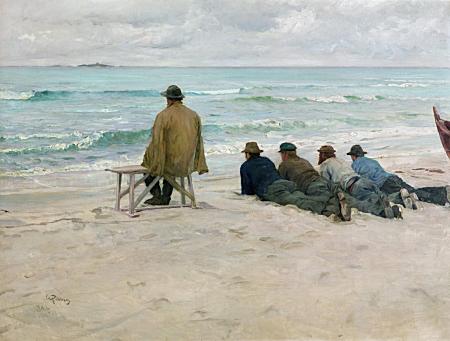
On Watch
1889
Eilif Peterssen
b. September 4, 1852
_______________________
"How many times must we witness the collapse of good intentions into horror and failure before we no longer allow the “Decent Left” to wear those good intentions like a mark of courage?"
Good Wars, Real or Imagined
Freddie deBoer jacobin
(....)
Not that I question their sincerity. Indeed, among liberals calling for the endless projection of American military power, there is almost limitless sincerity. Liberal hawks are bathed in sincerity; it seeps from their pores. That their sincere beliefs converge so perfectly with their professional self-interest is neither coincidence nor conspiracy; such are the consequences of a commitment to Doing Good. The conflicted, for their part, are not dishonest in announcing their interior anguish. What should disturb anyone is what, exactly, is at play in the conflict: knowledge of the reality of warmaking and imperial privilege played against the desperate progressive desire to find a good war, to support a good war.
(....)
I have to confess, and in confessing demonstrate my profound lack of moral seriousness: I cannot understand the mentality that searches for good wars. A good war, to me, is like a good famine or a good plague; I don’t go hunting for unicorns. But even if such a thing is real, history suggests that it is as rare as snow in the Sahara. Still, the liberal hawks will be surprised when they don’t find one in Syria. The benefit of being a hawk, after all, is that your beliefs remain reality-resistant. You can fail again and again and again, and your opposition can be proven right again and again and again, and you will suffer no professional or social consequences. For the unprincipled opportunists who choke our media, this represents no problem. For the true believers, those righteous moral hawks, I see pain ahead. They will once again be surprised to find that they live in a world that is indifferent to their bountiful caring, a broken world, a cruel world, one beyond saving through passion.
...(more)
_______________________
 1924 / 25
Oskar Schlemmer
b. September 4, 1888 – 13 April 1943)
Bauhaus 1919-1933: Workshops for Modernity
_______________________
On the convergence of war and wedding (PoemTalk #70)
Laura Mullen, 'Bride of the New Dawn
Bride of the New Dawn
Laura Mullen
She appears to be recognized as herself and not herself, new because endlessly recycled, not what she was but not what she will be—see? Not married and not not married, the processional’s a ritual meant to extend a magical present, until the head of this pin is the size of a rented hall and all of us angels stepping out on the long blank train of her on-going gown. To go in single and come married out is easy enough, what matters is to enlarge the interstitial, to live as long as we can in the not exactly no longer and the not quite not yet also. ...(more) from Laura Mullen's book Enduring Freedom: A Little Book of Mechanical Brides
_______________________
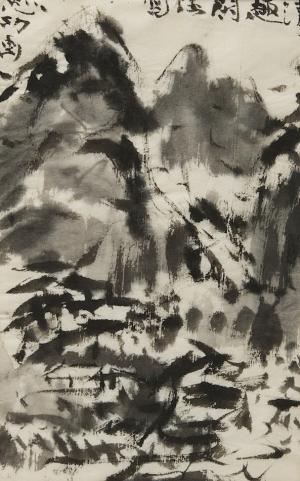
Shiko Munakata
b. September 5, 1903
_______________________
Libraries and E-books
Cory Doctorow
Locus
(....)
Publishers should be courting libraries as neutral parties and potential allies in the e-book wars. Publishers are in direct competition with e-book companies like Amazon, who publish e-books as well as selling them. But when Amazon sells an e-book, it gets mountains of business intelligence from the transaction: who is buying, where, from which keywords, and with what other books (for starters). What does the publisher get? An aggregate sales figure, 90 days after the fact. Of course Amazon is running circles around the Big Five publishers: the publishers know nothing about their customers, and Amazon knows everything about them.
(....)
The age of austerity has not been kind to libraries, and in many places they are the last ''storefront'' that still tries to put books into the hands of readers. Treating them like a captive market to be exploited is a huge - and potentially fatal - mistake on the part of publishers. If publishers wanted to get something truly valuable out of libraries, they could do no better than to help create a free, open alternative to Overdrive that gives them the data they need to compete with the e-book retailers and frees the libraries from their expensive circulation-management burdens.
...(more)
via Copyfight
_______________________
Notes on a Middle Aged Poet
Nyla Matuk
hazlitt
(....)
Fruit punch colours, like cocktail garnishes of yore,
on the gold-plated bling of backyard Gladyses.
Smoke Virginia Slims in middle age, rock a proto-
maxi, nag husbands, mutter from behind Fifty Shades of Grey.
You say, “Well, I’ll be hornswaggled!”
Great yardage, great yarmouths of a matador’s
oldest trick.
Bishop’s giant snail’s toad beseeches your love with his eyes,
by the blousy winds: youthful selling points.
...(more)
12 or 20 (second series) questions with Nyla Matukrob mclennan
_______________________
"I have nothing to say
and I am saying it
and that is poetry
as I needed it"
- John Cage
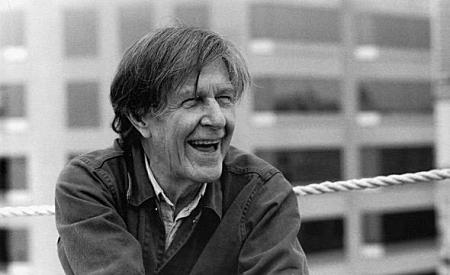
John Cage
b. September 5, 1912
photo by Betty Freeman
Some Rules and Hints for Students and Teachers or Anybody Else
John Cage
Find a place you trust, and then, try trusting it for a while.
(....)
Be happy whenever you can manage it. Enjoy yourself. It is lighter than you think.
_______________________
what if a much of a which of a wind
e.e. cummings
what if a much of a which of a wind
gives the truth to summer's lie;
bloodies with dizzying leaves the sun
and yanks immortal stars awry?
Blow king to beggar and queen to seem
(blow friend to fiend: blow space to time)
—when skies are hanged and oceans drowned,
the single secret will still be man
what if a keen of a lean wind flays
screaming hills with sleet and snow:
strangles valleys by ropes of thing
and stifles forests in white ago?
Blow hope to terror; blow seeing to blind
(blow pity to envy and soul to mind)
—whose hearts are mountains, roots are trees,
it's they shall cry hello to the spring
what if a dawn of a doom of a dream
bites this universe in two,
peels forever out of his grave
and sprinkles nowhere with me and you?
Blow soon to never and never to twice
(blow life to isn't:blow death to was)
—all nothing's only our hugest home;
the most who die, the more we live

photo - mw
_______________________
"Sleep and Waking"
Daryl Hine
1936 - 2012
The Malahat Review
Slow to slip over the crumbling cliff of sleep,
I clutched at wood that would not bear my weight,
Root words which time derived from rude verb-stems,
Scrabbling at syntactic stratagems
For narrative. And yet I could not wait
For the moment when I fell asleep.
When will it happen? When you least expect
It, I expect. You cannot anticipate,
Nor even guess, the moment or the hour
When your wakefulness and mine will change to our
Insentient although all-knowing state—
Not ever, least of all in retrospect.
...(more)
Daryl Hine at the Poetry Foundation
_______________________

Copy/pasting the physical world
The bookworks of Ragnhildur Jóhanns
Gary Barwin
jacket2
(....)
In Jóhanns’ work, the words on distant pages can speak to each other across pages like residents in an apartment building on their balconies looking up, looking down, passing grammar between them.
Jean Cocteau says, “The greatest masterpiece in literature is only a dictionary out of order." And what if that ‘out of order’ masterpiece were itself out of order? And what about the dictionary or the book considered as a form in itself, as a ‘masterpiece’ of its own? What happens if you take apart the book itself? When we read a book, we read so much beyond the words. So much beyond the grammar that the author presents.
...(more)
Ragnhildur Jóhanns and images of her work can be found at her website
_______________________

Lester "Prez" Young
NYC, 1948
Hot Summer, Cool Jazz: The Photographs of Herman Leonard
Robert Mann Gallery
via GmtPlus9 (-15)
_______________________
Don’t Click Click the Guilt Away
How Online Activism Has Sedated Rather Than Empowered Us
Yasmine Colijn
(....)
When Michael Pollan coined the concept of the glass abattoir, he could hardly have expected what glass screens have done to Western society. He imagined that if we took those areas in which the horrors of the world were being perpetrated, and cased them in glass, things would change. We would look in, be appalled at what was unfolding before our eyes and subsequently be compelled to act against them. Pollan thought making us eye-witness to disaster would prompt shock, outrage, and most importantly, action. These hopes were identical to the possibilities that the internet offered. People on one side of the globe would now be directly confronted with the suffering of those at the other end, with a simple click.
The reality has been the opposite. All the world is a glass cage, and we can watch the less fortunate from the comfort of our cushy homes. We marvel at the spectacle and rejoice in our privilege, rather than taking actual action. Now, this generation is not lazy. It is not apathetic. It is not the ‘Me Generation’ that others make it out to be. It simply would not recognise genuine activism if it pepper-sprayed us in the eyes. It is not that we do not want to act, it is that we think we already are. Online activism has slipped into clicktivism, allowing us to feel that sharing a video equals taking to the streets.
(....) If anything, online activism has become the end, rather than the means, for those growing up with the internet. Future revolutions will not be televised by the West. They will be tweeted, and that's all they will be. As long as our experience of unfairness is mediated by screens, our society may be constructed by panes of glass, but that glass also provides us with safety. Knowing that you will never have to actually experience what is happening to others is the biggest obstacle to online activism.
...(more)
Distilled_______________________

“Light in the Woods”
(1930)
Josef Breitenbach
1896 - 1984
1 2
_______________________
Theoria and Praxis: International Journal of Interdisciplinary Thought
Vol 1, No 1 (2013)
_______________________
“Who survives, who doesn’t?” An Interview with Margaret Atwood
Isabel Slone

The Dam
1891-1893
Henri Rousseau
(May 21, 1844 - September 2, 1910)
_______________________
R/EVOLUTIONS:
Global Trends and Regional Issues
First Issue
Far Away From Solid Modernity
Interview with Zygmunt Bauman
by Eliza Kania
The semantic field of the notion of “precariat” embraces people affected by insecurity or fragility of their social position and beset with the fear of losing it (loss of job and/or possessions, bankruptcy, social demotion and rejection); such a definition applies to a fast-growing section of the so-called “middle- classes.” What such a variegated assembly of individuals have in common, is the inadequacy of resources that would be necessary were they to cope unassisted with the individually striking and suffered misfortune: a task assigned to them in the same process of liquid-modern individualisation together with the counterfactual attribution of a capacity to fulfil it. The point is, however, that in precariat, as opposed to the proletariat as recorded in public memory, everybody suffers in solitude... The sufferings of “individuals by virtue of a decree” do not beget a vision of community of interests. Using the old vocabulary deriving from Hegel and adopted by Marx, one could say that precariat has meagre chances of passing from a modality of “class in itself” to that of a “class for itself” - that is, a tightly- knit political force. The mutual relations between precarians - regardless of whether they earn their living in an office a company, self-employment or in a factory - are governed by the principle of competition rather than solidarity.
...(more)
_______________________
Black Markets
Words without Borders
September 2013
... covering black markets: those underground exchanges of contraband that power parallel economies throughout the world. Goods both human and inanimate are traded in these shadowy venues, where everything from kidneys to diamonds is available, often at horrific cost. In fiction and essays, Wang Bang, Abdelilah Hamdouchi, Vladimir Lorchenkov, Jason Miklian, Dominique Manotti, Dmitri Novosolov, Edgard Telles Ribeiro, and Ye Yonglie explore clandestine systems around the world. And in the latest installment of our World through the Eyes of Writers feature, Poland's Pawel Huelle salutes poet Tomasz Rózycki.
_______________________
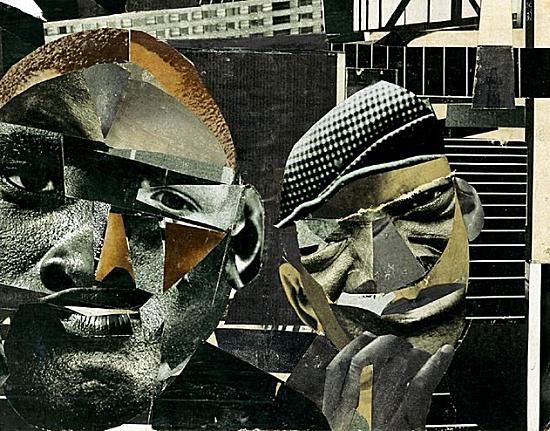
Romare Bearden
b. September 2, 1911
_______________________
Traumatized by Toast
Tom Pepper
A Review of The Trauma of Everyday Life, by Mark Epstein, M.D.
Speculative Non-Buddhism
(....)
In the case of Epstein’s version of Buddhist-influenced psychotherapy, it would probably be easy enough to tell what particular class position his ideology serves to produce if we could just get a list of the occupations of all of his clients, readers, and devotees. But, since this is not possible, we can always uncover the ideological function by simply reading his work. I will adumbrate my conclusions briefly here: Epstein’s work functions to reproduce the “professional” subject, living off the excess of capitalist production while functioning to administer the transfer of capitalist wealth from those who produce it to those who appropriate it. These are usually people who believe they have a morally correct livelihood, that what they do is far removed from the sordid taint of crass commercial exploitation. They are the lower stratum of the ruling class, and believe what they do is natural, necessary, and that they work hard to earn their comfortable lifestyles. Their need to remain ignorant of the exploitation and suffering that supplies their relative wealth, to remain ignorant, in fact, of what role they actually play in the social formation, requires that they remain poor or superficial thinkers, working in meaningless jobs, alienated and enervated and turning to “spirituality” or emotional relationships for fulfillment. Epstein’s pseudo-Buddhist trauma therapy is just the newest practice in which they can find some kind of distracting activity to keep them working, and to ensure that they do what they must, that they “work all by themselves,” without ever really knowing what it is they are doing.
(....)
In conclusion, I want to ask: why bliss? Why should this be the goal? Why not use Spinoza’s term: Joy. For Spinoza, for Freud (and, I would argue, for Buddha), the goal is not passive pleasure, delusion, and happy ignorance. Instead, we can take real pleasure in effortful interaction with the world, but only once we are made fully aware of our ideologies as ideologies, and become able to transform them to better fit human needs. Trauma is not an inevitable truth of human existence. It is what our ideologies cannot account for. Don’t bother trying to live fully in the sensory experience of a piece of toast. Start thinking about why so many people have no breakfast. Then you can begin to wake up, and maybe you won’t need so much therapy.
...(more)
_______________________

photo - mw
_______________________
In the Day of the Postman
Rebecca Solnit
(....)
Previous technologies have expanded communication. But the last round may be contracting it. The eloquence of letters has turned into the unnuanced spareness of texts; the intimacy of phone conversations has turned into the missed signals of mobile phone chat. I think of that lost world, the way we lived before these new networking technologies, as having two poles: solitude and communion. The new chatter puts us somewhere in between, assuaging fears of being alone without risking real connection. It is a shallow between two deep zones, a safe spot between the dangers of contact with ourselves, with others.
I live in the heart of it, and it’s normal to walk through a crowd – on a train, or a group of young people waiting to eat in a restaurant – in which everyone is staring at the tiny screens in their hands. It seems less likely that each of the kids waiting for the table for eight has an urgent matter at hand than that this is the habitual orientation of their consciousness. At times I feel as though I’m in a bad science fiction movie where everyone takes orders from tiny boxes that link them to alien overlords. Which is what corporations are anyway, and mobile phones decoupled from corporations are not exactly common.
(....)
It’s hard, now, to be with someone else wholly, uninterruptedly, and it’s hard to be truly alone. The fine art of doing nothing in particular, also known as thinking, or musing, or introspection, or simply moments of being, was part of what happened when you walked from here to there alone, or stared out the train window, or contemplated the road, but the new technologies have flooded those open spaces. Space for free thought is routinely regarded as a void, and filled up with sounds and distractions.
(....)
Getting out of it is about slowness, and about finding alternatives to the alienation that accompanies a sweater knitted by a machine in a sweatshop in a country you know nothing about, or jam made by a giant corporation that has terrible environmental and labour practices and might be tied to the death of honeybees or the poisoning of farmworkers. It’s an attempt to put the world back together again, in its materials but also its time and labour. It’s both laughably small and heroically ambitious.
Perhaps the young will go further and establish rebel camps where they will lead the lives of 1957, if not 1857, when it comes to quality of time and technology. Perhaps. Right now we need to articulate these subtle things, this richer, more expansive quality of time and attention and connection, to hold onto it. Can we? The alternative is grim, with a grimness that would be hard to explain to someone who’s distracted.
...(more)
_______________________

photo - mw
_______________________
Inner peace
We yearn for silence, yet the less sound there is, the more our thoughts deafen us. How can we still the noise within?
Tim Parks
(....)
Silence, then, is always relative. Our experience of it is more interesting than the acoustic effect itself. And the most interesting kind of silence is that of a mind free of words, free of thoughts, free of language, a mental silence — the state of mind my character Cleaver failed to achieve despite his flight to the mountains. Arguably, when we have a perception of being tormented by noise, a lot of that noise is actually in our heads — the interminable fizz of anxious thoughts or the self-regarding monologue that for much of the time constitutes our consciousness. And it’s a noise in constant interaction with modern methods of so-called communication: the internet, the mobile phone, Google glasses. Our objection to noise in the outer world, very often, is that it makes it harder to focus on the buzz we produce for ourselves in our inner world.
Yet all of us, at least occasionally, reach the point where the motor of thought feels out of control. Thoughts run away with themselves, go nowhere new, and are nevertheless destructive in their insistent revisiting of where we’ve been a thousand times before. So much of Modernist literature is about this buzz of consciousness, emphasising its poetic quality. One thinks of James Joyce, or Virginia Woolf. Some, however, understood how exhausting and destructive it could be: a character who can’t still her thoughts was ‘destroyed into perfect consciousness’, writes D H Lawrence in his novel Women in Love (1920). By contrast, a certain genre of late 20th-century literature — from Samuel Beckett through Thomas Bernhard to Sandro Veronesi, David Foster Wallace and many others — is dominated by a voice constantly trying to explain the world, constantly denouncing the scandal of the world, constantly disappointed and frustrated, but also pleased with itself, pleased with its ability to be scandalised, a voice whose ceaseless questioning and criticising has long become a trap, from which consciousness seeks release in various forms of intoxication, or sleep, or suicide. There is, as it were, a catharsis of exhaustion, exhaustion with the dazzling, disturbing voice of the mind.
(....)
Sitting still, denying yourself physical movement, the mind’s instinctive reaction is to retreat into its normal buzzing monologue — hoping that focusing the mind elsewhere will relieve physical discomfort. This would normally be the case; normally, if ignored, the body would fidget and shift, to avoid accumulating tension. But on this occasion we are asking it to sit still while we think and, since it can’t fidget, it grows more and more tense and uncomfortable. Eventually, this discomfort forces the mind back from its chatter to the body. But finding only discomfort or even pain in the body, it again seeks to escape into language and thought. Back and forth from troubled mind to tormented body, things get worse and worse.
Silence, then, combined with stillness — the two are intimately related — invites us to observe the relationship between consciousness and the body, in movement and moving thought. ...(more)
|


































